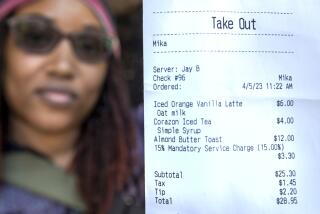GRIPES : Is Customer Service Dead? : No: Servers want to do right, but customers have to do their part. People who vent their foul moods on clerks and waiters aren’t talking to stones.
- Share via
Los Angeles — I find that I consistently get fine service, and I wonder who the people are who always complain that they can’t get good service anymore. Are they the people who demand that a restaurant bend its menu to their specific desires, ignoring the ambiance and gastronomical adventure created for them? Do they insist on telling the auto mechanic, plumber or tree trimmer how to do the jobs that they are paying them to handle? Do they insult a department-store sales clerk for clothes that don’t fit or are too expensive?
Good service is predicated on mutual respect between the customer and the waiter-sales clerk-plumber-electrician. One wonders about a customer who enters a restaurant and immediately asks that the music be changed, the air conditioning altered and the table moved while listing 15 dietary requirements. In a city like Los Angeles, there are hundreds of restaurants to choose from in various price ranges and with every kind of cuisine and environment. Why would someone who wants a conversational, romantic meal go to dine at an establishment that is designed to appeal to a high-energy, see-and-be-seen crowd?
But let’s assume that our customer has chosen the setting that matches his mood. Part of the magic of the dining experience is that maitre’d, waiter, chef, bartender, bus person, valet and manager all work together to create delicious and beautiful meals not only for them, but for an entire restaurant full of guests. That’s what makes dining out such a treat. Yet the complexities of teamwork and communication that go into each meal’s delivery take a lot of things out of the waiter’s control--for instance, a rush of orders or an accident in the kitchen can make the meal late. A customer who understands the waiter’s task will understand that he has still received good service.
Customers who understand all of this orchestration and effort don’t take out a foul mood on the waiter, or, on the flip side, demand jokes, entertainment or details of the waiter’s personal life. They understand that customers shouldn’t breach the respectful professional distance and expect the person serving them to become either best friend or whipping boy. These customers would never grab at a waiter who is obviously hustling to deliver a full tray of drinks, salads, coffee and desserts to four other tables to ask for the check immediately because, though they said nothing about it earlier in the meal, they have tickets to a show that starts in seven minutes. (“And can you get me a pack of Virginia Slims while you’re at it?”)
I am reminded of when I lived in Israel years ago and learned of the unique civilian-military integration in the Israeli army. Every able-bodied man (and many women) up to age 55 spends time every year fulfilling military duty. It is not uncommon for a company executive, for example, to find himself serving in a unit in which one of his underlings or his corner auto mechanic is his military superior. What this circumstance creates is a mutual respect for one another’s responsibilities and position.
Should we all switch roles and insist on customers first becoming waiters, mechanics, plumbers, tree trimmers, sales clerks, electricians? Probably not. But an understanding that customers are partners in the network of service will go a long way toward creating the experience we all desire.
More to Read
Eat your way across L.A.
Get our weekly Tasting Notes newsletter for reviews, news and more.
You may occasionally receive promotional content from the Los Angeles Times.










